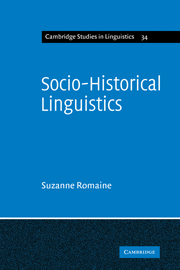Book contents
- Frontmatter
- Contents
- Dedication
- Preface
- Dedication
- 1 Methodology and aims
- 2 Methods for a sociolinguistic study of historical syntax
- 3 The history of the relative clause/markers in English with special reference to Middle Scots
- 4 The linguistic variables
- 5 The extralinguistic variables: methods for the reconstruction of language in its social context
- 6 Analysis of the data by two sociolinguistic techniques: cross-product analysis and implicational scaling
- 7 Variable rule analysis of the data
- 8 The bearing of sociolinguistic data on linguistic hypotheses
- 9 On the epistemological status of sociolinguistic theory
- Bibliography
- Index
9 - On the epistemological status of sociolinguistic theory
Published online by Cambridge University Press: 05 May 2010
- Frontmatter
- Contents
- Dedication
- Preface
- Dedication
- 1 Methodology and aims
- 2 Methods for a sociolinguistic study of historical syntax
- 3 The history of the relative clause/markers in English with special reference to Middle Scots
- 4 The linguistic variables
- 5 The extralinguistic variables: methods for the reconstruction of language in its social context
- 6 Analysis of the data by two sociolinguistic techniques: cross-product analysis and implicational scaling
- 7 Variable rule analysis of the data
- 8 The bearing of sociolinguistic data on linguistic hypotheses
- 9 On the epistemological status of sociolinguistic theory
- Bibliography
- Index
Summary
To show how a fact is useful is not to explain how it originated or why it is.
Emile Durkheim (1964: 90)Controversy is the yeast which keeps science in lively fermentation. But its progress is also beset with pseudo-controversies which appear to reflect differences in opinion, whereas in reality they only reflect differences of emphasis on single aspects of a complex process at the expense of others.
Arthur Koestler (1975: 246)Confusion is created by taxonomic principles appearing in the guise of causal mechanisms.
Rom Harré (1972: 203)Both Labov and Bailey agree that it is the ‘facts of variation’ which are central to linguistic theory. If a reasonable account of language change depends on the possibility of describing orderly differentiation within language, as they maintain, the problem is to decide which of the competing variationist theories, i.e. the quantitative or dynamic paradigm, is best able to incorporate the facts of variability within a linguistic description. There is, however, disagreement between the two over the set of facts a linguistic theory can properly choose to address, and what a formal model of grammar which incorporates the observation of variability looks like.
Bailey has emphasized in a number of places that linguistics must make dialectology central, but that ‘the job of linguists is linguistics’ (Bailey 1969a: 118).
- Type
- Chapter
- Information
- Socio-Historical LinguisticsIts Status and Methodology, pp. 239 - 289Publisher: Cambridge University PressPrint publication year: 1982
- 1
- Cited by



